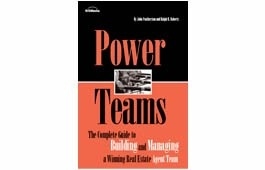
Excerpt series provides insight into recently released book
RISMEDIA, May 12, 2008-Far too many real estate agents are overworked and underpaid primarily because they try to do everything themselves. They are either unaware of the agent team approach or they do not realize the benefits that such an approach can deliver both professionally and personally. In Chapter 1 of RISMedia’s recently released book, Power Teams: The Complete Guide to Building and Managing a Winning Real Estate Agent Team by RISMedia President & CEO John Featherston and top-producing Broker Ralph R. Roberts, the team-based approach is explained in detail, revealing its many potential rewards. Following is an excerpt from Chapter 1:
What Is an Agent Team? Traditional Real Estate versus the Team- Based Approach
The traditional model of running a real estate business-the model that most agents follow-consists of working independently for a broker and performing the thousand and one tasks required to serve your clients all by yourself, such as:
• Answering phones and voice messages
• Filtering through and responding to e-mail
• Marketing yourself and your business online and off
• Networking
• Managing leads
• Meeting with clients and prospective clients
• Assembling and delivering marketing packets
• Delivering listing presentations to prospective sellers
• Coaching sellers on how to properly stage their homes
• Scheduling showings
• Showing homes to prospective buyers
• Obtaining feedback on showings
• Tracking and processing closing papers
• Calling past clients to keep in touch
With a team-based real estate business, on the other hand, after you get the business up and running you can clear the most time- and mind-consuming chores from your desktop and focus on marketing yourself, serving clients, and growing your business. The other members of your team manage the details such as answering phones, processing paperwork, scheduling appointments, and so on, so you can focus on the bigger picture. For example, you can whittle your responsibilities down to these tasks, depending on what type of client you serve:
• As a buyer’s agent, your three primary responsibilities may be to meet with prospective clients, show homes, negotiate the purchase price and terms, and follow up with Internet and phone leads. With the right systems in place, assistants can handle everything else, including researching homes in the area that meet your client’s specifications, scheduling appointments, and drafting your daily itinerary. You may spend the morning showing homes, but after your clients find a home and reach agreement on their offer, you simply call back to the office and pass your clients along to another team member, who schedules the closing and begins assembling the necessary paperwork. Other than attending the closing to watch your clients sign the papers and congratulate them on their new home, your job is complete, and you can focus on other clients.
• As a seller’s agent, you can save even more time per client, because you have more administrative work you can offload to assistants, such as assembling and delivering marketing packets, researching comparable properties, creating Microsoft PowerPoint presentations for prospective clients, taking photos or videos of homes, posting listings, and dealing with all the other details involved in marketing homes. Your job, then, is to work closely with the homeowners to make sure their properties are in marketable condition, obtain feedback from buyer’s agents on showings, pass that feedback along to the sellers, field offers and assist through the negotiating process. When negotiations are complete, you pass each transaction along to another team member, who ties up all the loose ends. After a brief cameo appearance at the closing, you’re ready for your next clients.
To order your copy of Power Teams, please click here.










